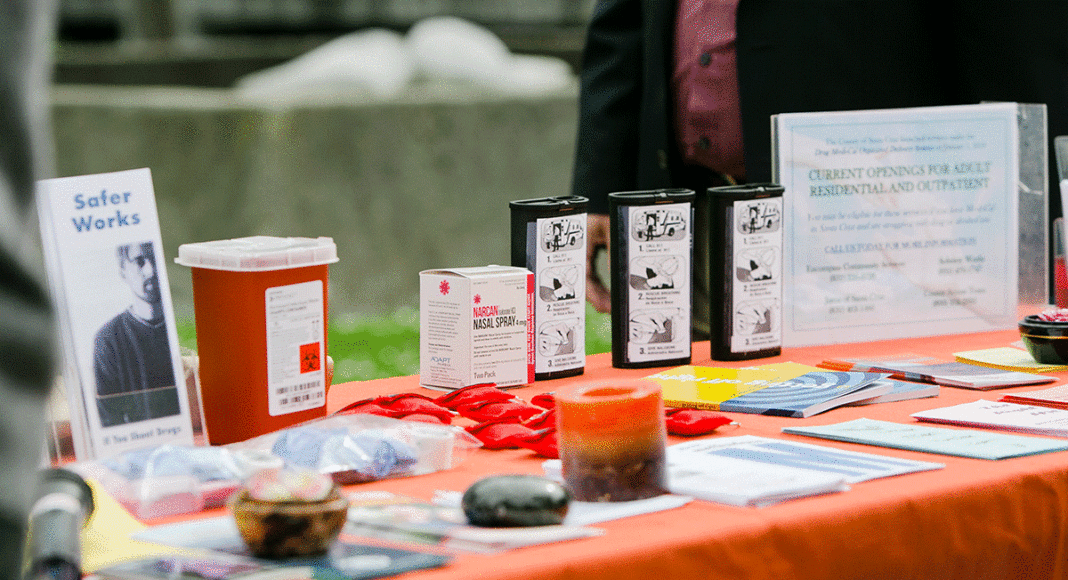After months of delays, a county commission assembled to study harm reduction in the county will start meeting this week.
It was more than a year ago now that the Santa Cruz County Board of Supervisors first approved a commission tasked with taking a close look at the county’s Syringe Services Program. Needle exchanges, like the county-run Syringe Services Program, reduce the spread of disease among injection drug users, research has shown. Some research has also shown that even the most permissive exchanges don’t correlate with increased litter. Additionally, activists believe that implications of increasingly tight restrictions on the county’s needle exchange may actually contribute to needle waste.
But after the public safety activists pushed the county to do something about needle waste in the county, the board decided that a body of community members should study the issues—in addition to passing new regulatory measures on the exchange.
The commission was originally scheduled to start meeting this past spring, under the oversight of the county’s Health Services Agency (HSA). But the onset of the Covid-19 pandemic sucked up pretty much all of the HSA’s resources and put plans for the commission on hold. The advisory body will hold its first meeting on Tuesday, Nov. 10 at 6pm.
The makeup of the body was not without some debate. Angry public commenters at county meetings often paint needle exchanges as enabling drug addiction. Activists from the Harm Reduction Coalition of Santa Cruz County contend that needle exchanges get addicts to take care of themselves—an important first step forward for an individual in a county that does not have enough drug treatment options in the first place.
Notably, 1st District County Supervisor John Leopold suggested at a meeting in October 2019 that the board should require that all members of the body believe in the virtues of needle exchanges.
Third District County Supervisor Ryan Coonerty, who represents the city of Santa Cruz and supported the commission, thought such a requirement would go too far.
Leopold, who ended up losing a reelection bid this month, suggested that, at a minimum, board should state that the commission will recognize the value of syringe exchanges in public health.
“People are going to appoint who they want, but we should be clear that this isn’t about denying the decades of research at every level about the efficacy of this public health practice,” he said at last year’s meeting.
Neither Coonerty nor 5th District County Supervisor Bruce McPherson wanted to accept Leopold’s revised amendment.
“I appreciate your concern, but I think we’re well aware of that on the board. I don’t want to accept the amendment,” McPherson said at the time.
The advisory commission has seven members—five members appointed by each of the county supervisors and two more at-large members approved by the board as a whole.
Commissioners include Damon Bruder, a frequent needle exchange critic, who was appointed by Coonerty.
Second District Supervisor Zach Friend, for his pick, appointed Sheriff Jim Hart, who opposed a recent application by the Harm Reduction Coalition of Santa Cruz County to become a certified secondary exchange of syringes.
Despite that controversy, the California Department of Public Health subsequently approved the coalition’s application and chipped in $400,000, granting it the authority to expand its syringe program.
The Harm Reduction Coalition’s own state-sanctioned program does not fall under the jurisdiction of the county and is thus outside the purview of the new commission.
For information on how to watch, visit: co.santa-cruz.ca.us/Government/Commissions,CommitteesAdvisoryBodies.aspx.














Needle exchange saved me from being infected,by late Deceased Husband,of AIDS. That was 30 years ago. Everyone,I mean Everyone Deserves that chance. The way bean counters are working,it will only Hinder this life saving Program,not enhance it. If it were Your Family Member,with this Disease,think on that for a minute. Harm Reduction Works cuz Prohibition DOESNT!